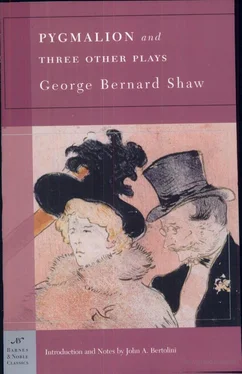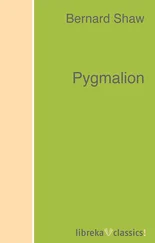WORKS BY SHAW
Collected Plays with Their Prefaces: Vols. 1-7. Edited by Dan H. Laurence. New York: Dodd, Mead, 1975.
The Collected Screenplays of Bernard Shaw. Edited by Bernard F. Dukore. Athens: University of Georgia Press, 1980.
Collected Letters. Edited by Dan H. Laurence. Vol. 1, 1874-1897, New York: Dodd, Mead, 1965; Vol. 2, 1898-1910, New York: Dodd, Mead, 1972; Vol. 3, 1911 — 1925, New York: Viking Press, 1985; Vol. 4, 1926-1950. New York: Viking Press, 1988.
The Drama Observed. Edited by Bernard F. Dukore. Vol. 1 : 1880 — 1895; Vol. 2:1895 — 1897; Vol. 3:1897-1911;Vol. 4:1911 — 1950. University Park: Pennsylvania State University Press, 1993. An invaluable collection of all Shaw’s writings about theater.
Shaw’s Music: The Complete Musical Criticism in Three Volumes. Edited by Dan H. Laurence. Vol. I:1876-1890; Vol. 2:1890 — 1893; Vol. 3:1893-1850. New York: Dodd, Mead, 1981.
BIOGRAPHY
Ervine, St. John G. Bernard Shaw: His Life, Work, and Friends. New York: William Morrow, 1956. The most sympathetic and fair biography of Shaw.
Henderson, Archibald. George Bernard Shaw: Man of the Century. New York: Appleton-Century-Crofts, 1956.
Holroyd, Michael. Bernard Shaw, Vol. 1, 1856-1898 : The Search for Love, New York: Random House, 1988. Bernard Shaw, Vol. 2, 1898-1918: The Pursuit of Power. New York: Random House, 1989. Bernard Shaw, Vol. 3, 1918-1950 : The Lure of Fantasy. New York: Random House, 1991. Bernard Shaw, Vol. 4, 1950-1991: The Last Laugh. New York: Random House, 1992. The most detailed and comprehensive biography. A condensed version is available: Bernard Shaw: The One- Volume Definitive Edition. New York: Random House, 1998.
Shaw, George Bernard. Interviews and Recollections. Edited by A. M. Gibbs. Iowa City: University of Iowa Press, 1990. An indispensable record of first-hand personal views of and by Shaw.
CRITICAL WORKS
Bentley, Eric. Bernard Shaw. New York: New Directions, 1947.
Berst, Charles A. Bernard Shaw and the Art of Drama. Champaign-Urbana: University of Illinois Press, 1973.
Bertolini, John A. The Playwrighting Self of Bernard Shaw. Carbon-dale and Edwardsville: University of Southern Illinois Press, 1991.
Crompton, Louis. Shaw the Dramatist. Lincoln: University of Nebraska Press, 1969.
Dukore, Bernard. Shaw’s Theatre. Gainesville: University Press of Florida, 2000.
Evans, T. F., ed. Shaw: The Critical Heritage. London: Routledge, 1976.
Gibbs, A. M. The Art and Mind of Shaw. New York: Macmillan, 1983.
Gordon, David J. Bernard Shaw and the Comic Sublime. New York: St. Martin’s Press, 1990.
Holroyd, Michael, ed. The Genius of Shaw. New York: Holt, Rine hart and Winston, 1979.
Meisel, Martin. Shaw and the Nineteenth-Century Theater. Princeton, NJ: Princeton University Press, 1963. A brilliant and delightful account of Shaw’s relationship to the theater of his youth.
Morgan, Margery M. The Shavian Playground. London: Methuen, 1972.
Shaw: The Annual of Bernard Shaw Studies: Vols. 1-22 successive. General editors: Stanley Weintraub, Fred D. Crawford, Gale K. Larson. University Park: Pennsylvania State University Press, 1981-2003.
Turco, Alfred, Jr. Shaw’s Moral Vision. Ithaca, NY: Cornell University Press, 1976.
Valency, Maurice. The Cart and the Trumpet. New York: Oxford University Press, 1973.
Watson, Barbara Bellow. A Shavian Guide to the Intelligent Woman. New York: W. W. Norton, 1972. Still the best case for Shaw as a feminist.
Wisenthal, J. L. The Marriage of Contraries. Cambridge, MA: Harvard University Press, 1974.
Leader of a heresy (belief contrary to orthodox tenets of a religion).
German publisher of American and British literature (including Shaw).
Viewpoint, outlook (German).
Pun on an actual spinal pathology, Pott’s disease.
One who vaunts the worth of the male gender.
That is, the question of whether women are morally superior to men.
Quotation from Shakespeare’s Henry V (act 4, scene 1).
English translation: Beyond Good and Evil (1886).
Shaw borrows F. J. Wilson’s term for the morbid dwelling on Christ’s suffering.
john S. Stuart-Glennie (1832 — 1909?) was a Scots writer and historian; English historian Henry Thomas Buckle (1821 — 1862) is the author of History of Civilization in England.
In later editions Shaw added here “of my acquaintance,” after he had become friends with Stuart-Glennie.
Dives is Latin for “rich”; Shaw is referring to the biblical story of Lazarus and the Rich Man (see Luke 16:19-31).
Reference to Aymerigot Marcel, governor of Aloise, described in Chronicles, an account of the HundredYears’ War by Jean Froissart (1333?-c. 1405).
Prince Pyotr Kropotkin (1842-192 1), Russian geographer and anarchist.
Reference to The Works of Geoffrey Chaucer (1896), beautifully illustrated by English painter Edward Burne-Jones and printed by William Morris (English artist and founder of Kelmscott Press); this edition of Chaucer’s works represents aestheticism.
By leaping (Latin).
English poet ( 1612- 1680); author of the long satirical poem Hudibras, mentioned below.
Indifference to religion; as charged against the Laodiceans in the Bible, Revelation 3:14 — 22.
Reference to English poet Thomas Hood’s “The Song of the Shirt” (1843), which laments the hard laboring lives of seamstresses.
American thinker and economist (1839-1897), whose 1884 London lecture on society and economics led Shaw into socialism.
That is, Doctor Haggage in Charles Dickens’s Little Dorrit (1855-1857), a novel that Shaw considered an indictment of capitalism.
Persistent debt collectors.
T. Henry Howard, Salvation Army chief of staff (1912 — 1919).
British colonial trading posts were run by factors, or agents, and thus were called factories.
Bishops of the Church of England, when sitting as a ruling body.
Reference to Russian writer Maxim Gorky (pen name of Aleksey Peshkov, 1868-1936).
Shaw refers to the unsuccessful Russian Revolution of 1905.
Distributors of charity.
Between Alfonso XIII of Spain and Victoria Eugenie, granddaughter of Queen Victoria, on May 31, 1906.
Reference to Spanish anarchist Mateo Morral, who threw a bomb at King Alfonso XIII’s wedding party and later committed suicide.
An explosive.
Читать дальше












